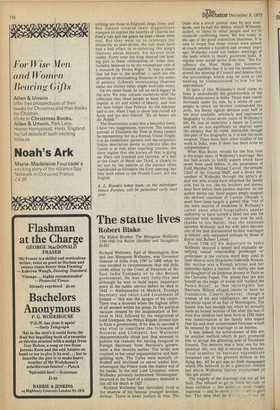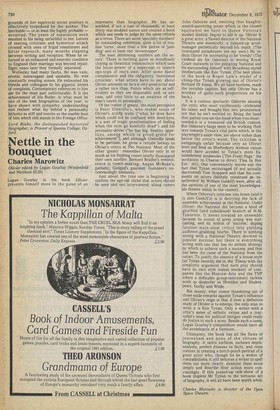The statue lives
Robert Blake
The Eldest Brother, The Marquess Wellesley 1760-1842 Iris Butler (Hodder and Stoughton £5.95) Richard Wellesley, Earl of Mornington, first and last Marquess Wellesley, was Governor General of India from 1797 to 1805 when he was recalled in circumstances that did little credit either to the Court of Directors of the East India Company or to the British government. He was only forty-five and although he was to hold many important posts in the public service before he died in 1842 — Ambassador in Madrid, Foreign Secretary and twice Lord Lieutenant of Ireland — this was the apogee of his career. There was a moment when the highest office of all seemed within his grasp. In the political vacuum created by the assassination of Perceval in 1812, followed by the resignation of Lord Liverpool, the Prince Regent invited him to form a government. If he was to succeed it was vital to conciliate the followers of Perceval and Liverpool, but Wellesley characteristically chose just that moment to publish his reasons for having resigned as Foreign Secretary from Perceval's government a few months earlier. The letter was couched in his usual argumentative and hairsplitting style. The Tories were mortally offended and declined to serve under him, whereupon the Prince took the matter out of his hands. In the end Lord Liverpool, whom Wellesley privately nicknamed 'Stinkingson', returned at the head of a ministry destined to last till his death in 1827.
Richard Wellesley has inevitably lived in the shadow of his famous younger brother, Arthur. There is basic justice in this. The
Duke was a much greater man by any standards, and he had the ability, which Wellesley lacked, to listen to other people and try to reconcile conflicting views. We live today in the age of the good committee chairman. It is easy to forget that these virtues were almost as much needed a hundred and seventy years ago. Wellesley could not endure meetings of the body which in theory governed India. A regular note would arrive from him. "His Excellency the Most Noble the GovernorGeneral signifies that it is not his intention to attend the meeting of Council and desires that the proceedings which may be held at the meeting be communicated to him for his approbation."
In spite of this Wellesley's chief claim to fame is undoubtedly his governorship of the British possessions in India. These were vastly increased under his rule, by a series of campaigns in which his brother commanded the army. Iris Butler rightly devotes over half of her most readable, scholarly and impressive biography to those seven years of Wellesley's life. He was as imperious a figure as Curzon and left no less significant an imprint upon the country that he ruled. Admirable though this part of the biography is, it is not the most oroginal. There have been other studies of his work in India, even if there has been none so comprehensive.
What Miss Butler reveals for the first time is the tragic story of Wellesley's marriage. She has had access to family papers which have never been used before, in the possession of Field Marshal Sir Michael Carver, the present Chief of the General Staff, and a direct descendant of Wellesley through the latter's eldest son who would have inherited the family title, had he not, like his brothers and sisters, been born before their parents married. As the author points out, these papers amply support the shrewd comment of Curzon (though it must have been largely a guess) that "one of the main sources of weakness in Wellesley's career upon which biographers appear uniformly to have turned a blind eye was his relations with women." It can now be said, thanks to Iris Butler, that the relations between Wellesley and his wife have become one of the best documented broken marriages in history, only surpassed perhaps by those of Byron and Bulwer Lytton. From 1786 till his departure to India Wellesley enjoyed a deeply and mutually satisfying sexual relationship (prelacque or prelacquer is the curious word they used in their letters) with Hyacinthe Gabrielle Roland. Her mother was a French actress and her ostensible father a banker. In reality she was the daughter of an Irishman known in Paris as the Chevalier Fagan. The gossip that she was herself on the stage, or worse still 'walked the Palais Royal', as that incorrigible liar Harriette Wilson alleged, seems to have no foundation. Clearly however, though a woman of wit and intelligence, she was not the social equal of an Earl of Mornington. The liaison was bad enough but when he actually made an honest woman of her after the last of their five children had been born in 1795 there was consternation in the family who hoped that his and their embarrassed fortunes would be restored by his marriage to an heiress.
It was, indeed, the achievement of this aim by another method which in part prompted him to accept the glittering post of Governor General. The decision was a fatal one for his personal life, nor did it recoup his fortune. Total inability to restrain expenditure remained one of his greatest defects to his dying day. All he got was an Irish marquisate which Pitt believed to be a generous reward but which Wellesley furious stigmatised as 'the gilt potato'.
The tragedy of the marriage was not all his fault. She refused to go to India because of their children — her instini.ts were deeply maternal — and he never it tt;,. III art 1,,rgave her. The idea that he (11,, ..r1 her on
grounds of her equivocal social position is effectively torpedoed by the author. The inevitable — or at least the highly probable — occurred. The years of separation soon resulted in his being unfaithful to her. Letters of searing criticism and hysterical attack crossed with ones of frigid resentment and bitter reproach, many months elapsing between writing and reception. When he returned in an exhausted and neurotic condition to England their marriage was beyond repair. Eight years later they formally separated. Wellesley had many faults. He was vain, erratic, extravagant and unstable. He was constantly creating scenes. He exhausted his friends and colleagues by his gigantic letters of complaint. Contemporary references to him are for the most part unfavourable. It is the achievement of Iris Butler, in what must be one of the best biographies of the year, to have shown with sympathy, understanding and realism what lay behind a personality hitherto as stiff and remote as the marble bust of him which still stands in the Foreign Office.
Lord Blake, the distinguished historical biographer, is Provost of Queens College, Oxford.











































 Previous page
Previous page